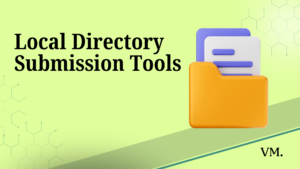The best local SEO reporting tools have become indispensable for SEO professionals and agencies managing multiple clients across different geographic markets. As local search continues to dominate how consumers discover local businesses, selecting the right reporting analytics platform directly impacts your ability to demonstrate ROI and scale your agency operations.
This comprehensive guide evaluates the top-performing local SEO reporting tools, comparing features, pricing, and real-world website performance to help you make an informed decision for your agency’s specific needs.
What Makes a Local SEO Reporting Tool Essential for Agencies?
Before diving into specific platforms, understanding why reporting tools matter sets the foundation for your selection process. Local search rankings fluctuate constantly, and clients demand transparency into campaign performance.
The best local SEO reporting tools automate the tracking process, consolidate data from multiple sources, and translate complex metrics into actionable insights your clients understand.
Key considerations include automated reports generation, white-label reporting options, integration with existing marketing platforms, and real-time data updates.
These capabilities reduce manual work significantly while establishing your agency SEO insights as a data-driven partner worthy of premium retainer fees.
7 Best Local SEO Reporting Tools Comparison in 2026
1. SEMrush: The All-in-One Platform for Local Rank Tracking
SEMrush maintains its position as a comprehensive solution for agencies managing local SEO campaigns. The platform combines keyword tracking, competitor analysis, local rank tracking, and automated reporting into a unified dashboard.
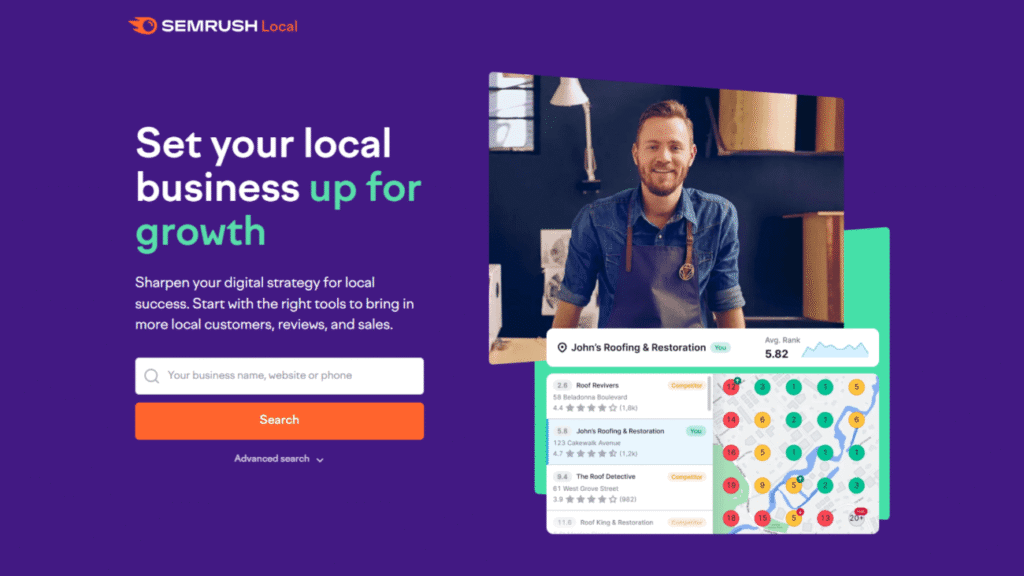
Key Features:
Keyword Research and Tracking Tools: SEMrush excels in identifying high-performing local keywords specific to target geographic areas. The keyword research tools integrate search volume data, keyword difficulty scores, and location-specific intent signals, enabling agencies to build hyper-targeted strategies. Track keyword local rankings across multiple search engines and geographic locations through a single SEO dashboard, monitoring performance trends over time.
Google My Business (GMB) Management: The GMB insights integration allows agencies to optimize client listings directly within the platform. Features include review monitoring across platforms, citation management to ensure NAP consistency, and competitive insights showing how client GMB listings compare to competitors’ online presence. This integration significantly reduces manual work spent auditing business listings across directories.
Local Rank Tracking and Competitor Analysis: Monitor business ranks on Google Maps and traditional search results with real-time data updates. The competitor analysis tools show exactly which keywords competitors rank for, their estimated traffic volumes, and their backlink strategies. This competitive intelligence informs your client reporting and strategic recommendations.
Automated Reports and White-Label Reporting: Generate comprehensive ranking reports automatically on your preferred schedule. White-label reporting options allow you to brand reports with your agency logo and color scheme, strengthening client relationships and positioning your agency as the SEO expert managing the strategy.
Pros:
- Comprehensive toolset covering the entire local SEO spectrum
- Intuitive interface requiring minimal training for team members
- Detailed reports save significant time compared to manual reporting
- Strong integration capabilities with popular marketing platforms
- Reliable local search rankings data from multiple search engines
Cons:
- Premium pricing may challenge smaller agencies with limited budgets
- Extensive feature set can overwhelm new users during onboarding
- Some advanced customization options require additional training
Pricing:
SEMrush offers tiered pricing starting around $119/month, scaling up to enterprise solutions for agencies managing extensive client portfolios.
2. BrightLocal: Specialized Local SEO Agency Solution
BrightLocal has carved out a unique position as the specialized platform for agencies prioritizing local search optimization. The platform’s entire architecture centers around local SEO workflows rather than attempting to be an all-in-one solution.
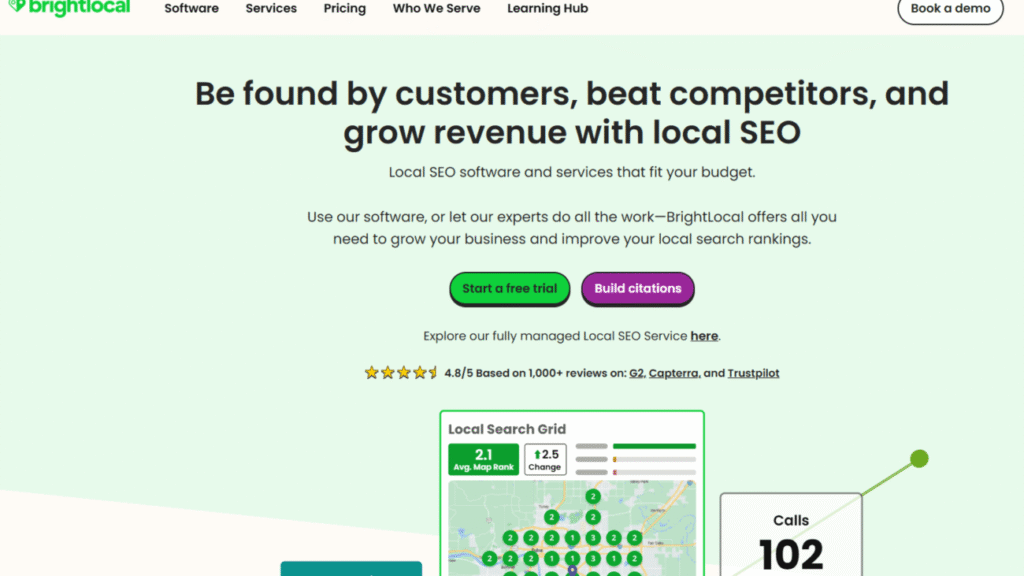
Key Features:
Citation Management and Local Listings: BrightLocal’s citation management tools excel at ensuring NAP consistency across hundreds of online directories and review sites. The platform audits current citations, identifies missing listings, and provides actionable recommendations for improvements. For agencies handling multiple local clients, this automation eliminates hours of manual directory research and updates.
Local Rank Tracking: Monitor business ranks on Google Maps, Google Local Pack, and traditional search results. Track local rankings for individual keywords across multiple locations, viewing how client SEO performance compares to competitor insights in real-time. The local rank tracker provides granular visibility into which specific keywords drive clients toward the top positions.
GMB Optimization Tools: Built-in GMB insights integration allows direct management of client listings. Review monitoring capabilities alert agencies to new customer reviews across platforms, enabling rapid response to positive feedback or reputation management issues.
Customization Options and White-Label Reporting: Create highly customized client SEO dashboards reflecting each client’s specific business needs. White-label reporting features ensure all client-facing deliverables display your agency branding, strengthening brand recognition and client retention.
Automated Reports: Schedule reports to deliver automatically on your preferred frequency, from weekly to monthly delivery. This automation saves agencies tremendous time while ensuring clients receive consistent performance updates without manual intervention.
Pros:
- Purpose-built for local SEO agencies rather than generalist platform
- Intuitive interface with minimal learning curve
- Strong focus on citation management and GMB optimization
- Excellent customer support specifically trained on local SEO challenges
- Competitive pricing relative to feature depth
Cons:
- Limited advanced SEO features beyond local search focus
- Occasional data discrepancies reported by some users
- Customization options less extensive than enterprise competitors
Pricing:
BrightLocal offers plans start around $99/month for agencies, with various tiers offering additional features and client allocations.
3. SE Ranking: Backlink Analysis and Competitive Intelligence
For agencies placing emphasis on link-building strategies and competitive research, SE Ranking delivers unmatched depth in backlink analysis and keyword competitor research capabilities. The platform’s extensive web crawl provides comprehensive data on competitor strategies and ranking factors.
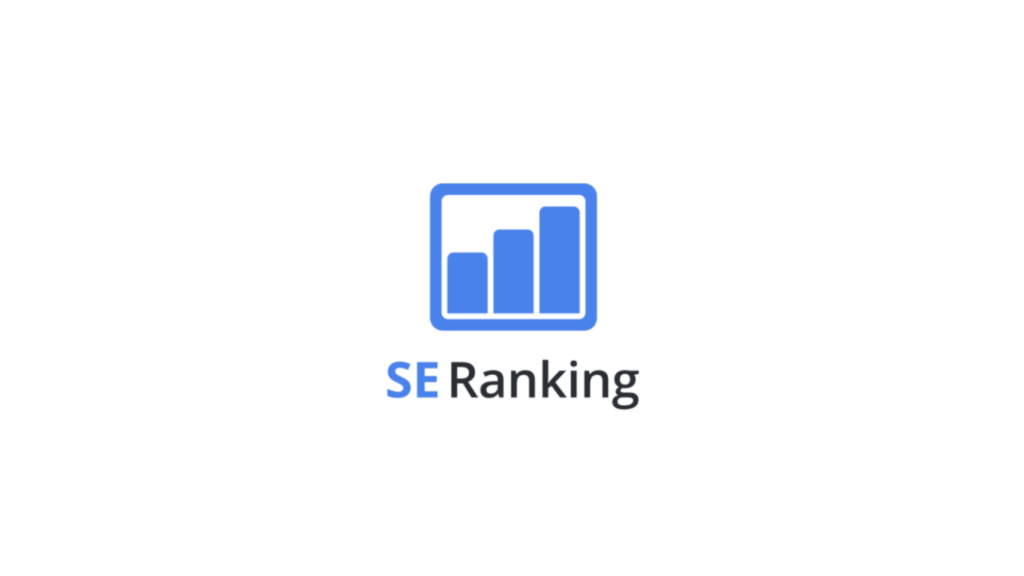
Key Features:
Comprehensive Backlink Analysis: SE Ranking maintains one of the web’s largest link databases, enabling agencies to analyze competitor backlink profiles with exceptional detail. Identify the specific websites linking to competitors, understand anchor text strategies, and discover link-building opportunities your agency can pursue for clients.
Keyword Research Tools: The keyword explorer provides search volume, keyword difficulty, and click-through rate estimates for thousands of keywords. Filter by location to identify local keywords with commercial intent, informing content marketing strategies and PPC bidding decisions within local markets.
Competitor Analysis: View comprehensive competitor insights showing organic traffic estimates, top-performing pages, and the specific keywords driving their search visibility. This intelligence informs client reporting, allowing you to contextualize client performance against competitive benchmarks.
Citation Tracking and Review Monitoring: Track where client businesses appear across online directories and review platforms. Monitor reviews across multiple review sites, helping agencies manage client reputation and respond to customer feedback promptly.
Pros:
- Industry-leading backlink data quality and comprehensiveness
- Powerful keyword competitor research tools ideal for strategy development
- Excellent competitor analysis capabilities
- Reliable data sources inform strategic recommendations
- Strong integration with other marketing platforms
Cons:
- Premium pricing positions SE Ranking primarily for larger agencies
- Learning curve can challenge users unfamiliar with backlink analysis
- Advanced features may exceed needs of agencies focusing solely on local search
Pricing:
Essential plan: $65/month
Pro: $95 – 119/month
Business: $207- 259/month
Enterprise: Custom pricing
Agency Pack (Add-on): $50/month
4. Moz Local: Citation Management and Historical Ranking Data
Moz Local specializes in the foundational elements of local SEO: accurate business listings, citation consistency, and historical ranking performance tracking.
For local seo agencies prioritizing listing optimization and local search visibility, Moz Local provides essential functionality.
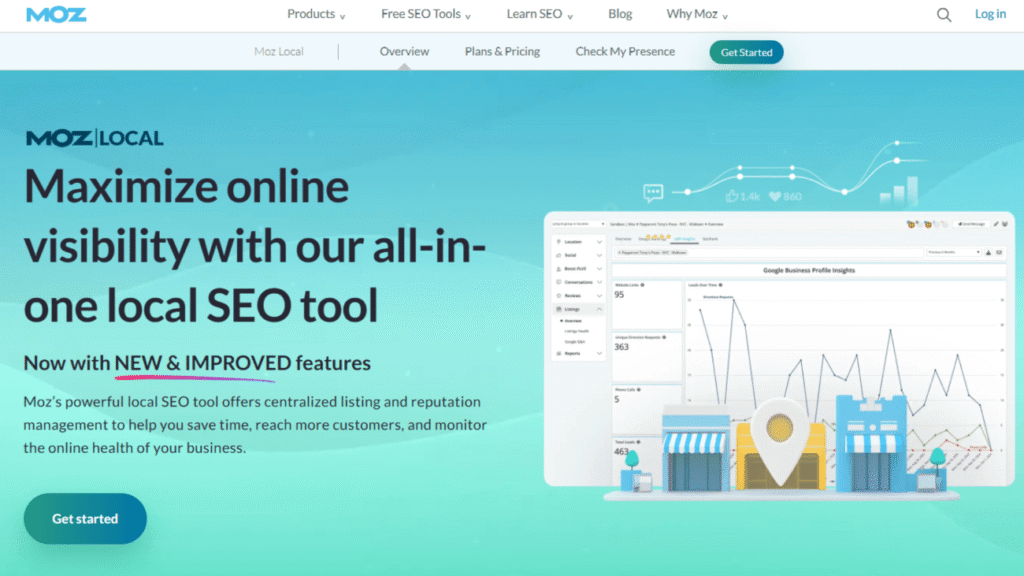
Key Features:
Citation Management – Moz Local automatically submits client business information to major directories and review sites, ensuring consistent NAP information across the web. The citation management tools identify missing listings and problematic data, then guide corrections to improve local search visibility.
Historical Ranking Data Tracking – Monitor how client business ranks fluctuate across tracked keywords and geographic locations over extended periods. This historical perspective shows whether SEO efforts produce sustained ranking improvements or temporary fluctuations, informing client discussions about strategy adjustments.
Automated Reporting – Generate scheduled reports delivering ranking data, citation updates, and performance insights to clients automatically. The reporting templates save significant time while maintaining professional presentation standards.
Local Search Visibility Monitoring – Track how frequently clients appear in local search results, Google Maps results, and knowledge panels for targeted keywords and geographic areas.
Pros:
- Straightforward interface focused specifically on local SEO needs
- Excellent citation management automation
- Reliable historical ranking data helps identify long-term trends
- Strong listing management capabilities across multiple directories
- Reasonable pricing for specialized local SEO functionality
Cons:
- Limited advanced SEO features beyond local listings focus
- Pricing may feel less competitive compared to more comprehensive platforms
- Data set slightly smaller than some enterprise competitors
Pricing:
Moz Local plans start around $99/month, offering good value for agencies prioritizing citation management and local visibility tracking.
5. Agency Analytics: Flexible Customization and Integration
Agency Analytics distinguishes itself through exceptional flexibility in report customization and seamless integration with existing marketing technology stacks.
For agencies using multiple right tools, this platform bridges disparate data sources into unified client dashboards.
Key Features:
Advanced Customization Options: Create fully customized SEO dashboards and client reporting templates matching your specific business needs and client preferences. The customization depth allows agencies to highlight metrics most relevant to individual client businesses, strengthening perceived value of ongoing SEO services.
White-Label Reporting: Brand all client-facing reports with your agency logo and color scheme, reinforcing your authority and supporting premium positioning in client relationships.
Integration with Multiple Data Sources: Seamlessly integrate data from Google Analytics, Google My Business, SEMrush, Ahrefs, and dozens of other marketing platforms. This unified approach eliminates manual data consolidation and ensures clients see consistent performance across all channels.
Automated Reporting and Scheduling: Configure reports to generate and deliver automatically on your preferred schedule, reducing manual work while ensuring consistent client communication.
Backlink Analysis and Competitive Intelligence: Monitor competitor backlink strategies and identify link-building opportunities relevant to client SEO campaigns.
Local Rank Tracking: Track business ranks on Google Maps and traditional search results across targeted keywords and geographic locations, delivering performance insights through automated reporting.
Pros:
- Exceptional flexibility in dashboard and report customization
- Strong integration capabilities with popular marketing platforms
- User-friendly interface requires minimal training
- Excellent for agencies using multiple specialized powerful tools
- Responsive customer support team
Cons:
- Advanced features require investment in setup and configuration
- Some users report pricing increases for additional client campaigns
- Less specialized than platforms dedicated specifically to local SEO
Pricing:
Agency Analytics offers flexible pricing starting around $79/month, scaling based on the number of client campaigns and required features.
6. Google Search Console: Free Tools for Search Performance Monitoring
Google Search Console remains an indispensable free tool for agencies seeking essential SEO data and genuine insights into how search engines perceive client websites, particularly for local search performance.
As a foundational SEO tool in every agency’s reporting arsenal, Google Search Console provides data directly from Google’s index, offering unmatched accuracy for local search visibility tracking.
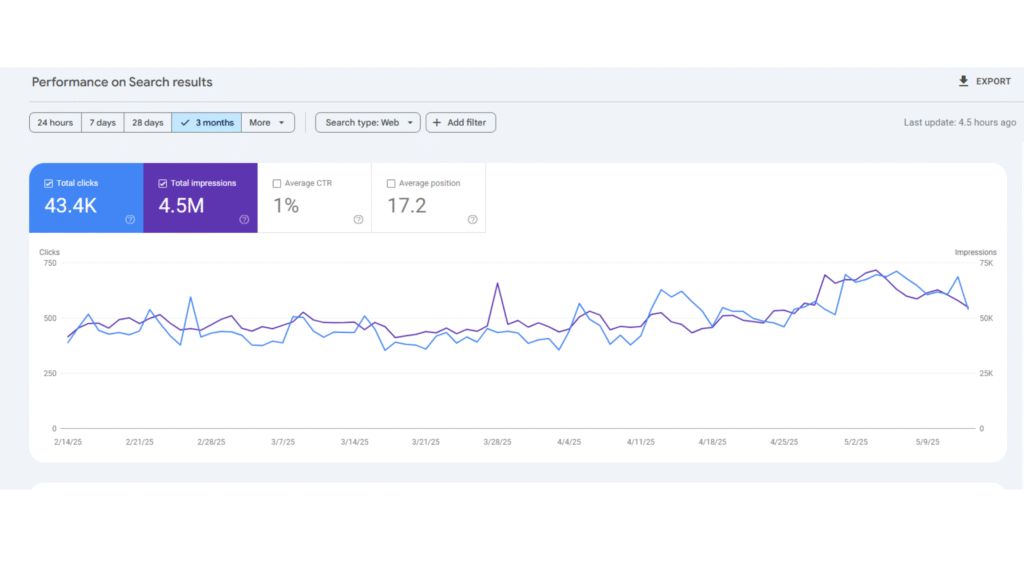
Key Features:
Search Performance Metrics: Access comprehensive search performance metrics showing the specific queries triggering appearances in Google search results, click-through rates, and average position data for local keywords. This data reveals exactly which search queries drive qualified traffic to client websites, informing content strategy and keyword targeting decisions.
Geographic Performance Tracking: Filter search performance data by geographic location, showing which regions drive the most organic traffic to client websites. For agencies managing clients targeting multiple geographic markets, this geographic breakdown reveals where local SEO efforts generate strongest results and where additional optimization may be needed.
Keyword Rankings for Local Searches: Monitor keyword rankings for location-specific search queries within Google Search Console. Unlike third-party rank tracking best tools relying on estimated position data, Google Search Console provides firsthand data from Google’s search results, ensuring accuracy for local SEO reporting.
Indexing Status and Error Detection: Identify indexing issues preventing local search visibility and website crawl errors impacting search engine perception. These technical indicators often reveal obstacles preventing pages from ranking in local search results.
Integration with Analytics and Reporting: Google Search Console integrates directly with Google Analytics and Google Data Studio, enabling agencies to build comprehensive data points performance dashboards combining search data with website behavior analytics. This unified approach eliminates manual data consolidation while ensuring reporting accuracy.
Practical Applications for Local SEO:
- Monitor keyword local rankings for location-specific search queries across target markets
- Identify geographic areas driving the most organic traffic to client websites
- Detect indexing issues preventing pages from appearing in local search results
- Track clicks from local search results compared to broader search visibility patterns
- Identify underperforming pages that could benefit from on-page optimization
- Monitor changes in average position for tracked keywords over extended time periods
- Identify new keyword opportunities clients currently rank for but haven’t optimized
Pros:
- Completely free access to first-party Google search data
- No additional budget required for essential local SEO monitoring
- Integrates seamlessly with Google Analytics and Google Data Studio
- Provides accurate position data directly from Google search results
- Enables geographic performance segmentation for multi-location clients
- Requires no setup beyond verifying website ownership
Cons:
- Limited historical data retention compared to paid rank tracking tools
- Less user-friendly interface than specialized reporting platforms
- Minimal automated reporting features requiring manual dashboard creation
- Lacks competitor analysis and backlink monitoring capabilities
- Limited customization options for white-label client reporting
Best Use Cases:
Google Search Console works particularly well for agencies seeking free baseline performance tracking, validating local SEO strategy effectiveness before investing in comprehensive reporting platforms, or supplementing paid tools with verified Google data.
The platform’s integration capabilities make it an essential component of most agency reporting workflows regardless of other platform investments.
7. Local Falcon: Advanced Free Dashboard Creation for Local SEO Agencies
Local Falcon revolutionizes free local SEO reporting by enabling agencies to transform raw data into visually compelling client dashboards without investing in expensive reporting software.
Unlike generic dashboard best local seo tools, Local Falcon specializes specifically in local SEO metrics, connecting multiple local search data sources into unified performance visualizations designed specifically for local rank tracking and competitive monitoring.
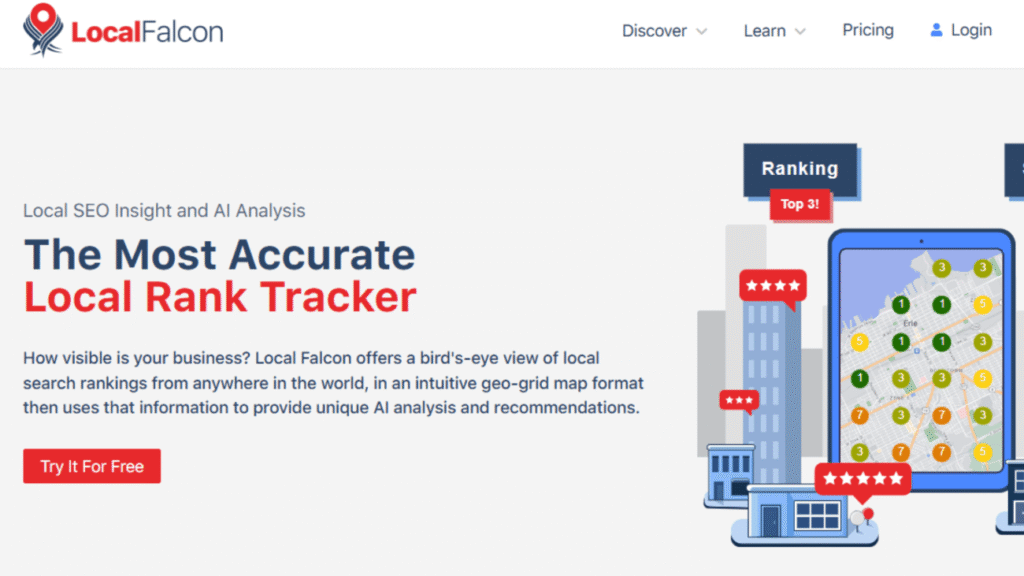
Key Features:
Local Rank Tracking Dashboard: Create custom dashboards displaying local keyword rankings across multiple geographic locations and search engines. Monitor business ranks on Google Maps and traditional search results through interactive visualizations showing performance trends over time. The specialized local focus means Local Falcon understands which metrics matter most for local SEO agencies.
Multi-Source Data Integration: Connect multiple data sources including Google Analytics, Google Search Console, Google My Business, and third-party rank tracking tools to create unified performance dashboards. This consolidated approach eliminates the need for agencies to manually compile data from disparate platforms before presenting to clients.
Competitive Local Rank Tracking: Compare client keyword rankings against direct competitors within specific geographic markets. See exactly which competitors rank above your clients for critical local keywords, identifying optimization opportunities where competitive rank gaps exist.
Interactive Client Dashboards: Build interactive visualizations allowing clients to explore local SEO performance data independently. Clients can drill down into specific geographic areas, keywords, and time periods to understand performance drivers without requiring agency assistance.
Automated Report Generation and Delivery: Generate automated report delivery through scheduled emails ensuring clients receive consistent performance updates without manual intervention. The automation saves significant agency time while maintaining professional client communication standards.
Date Range Comparisons: Build month-over-month performance comparisons showing whether local SEO efforts produce sustained ranking improvements. This temporal perspective helps clients understand seasonal fluctuations versus true optimization progress.
Customization Capabilities:
- Create custom dashboards showcasing metrics most relevant to specific client objectives
- Build date range comparisons showing month-over-month and year-over-year performance trends
- Generate automated report delivery through scheduled emails at your preferred frequency
- Display interactive visualizations allowing clients to explore performance data independently
- Combine local rank tracking data with Google Analytics insights into consolidated dashboards
- White-label dashboard presentation with custom branding for client-facing reporting
- Filter performance data by geographic location, keyword category, or search engine type
Specialized Local SEO Focus:
Unlike generic dashboard tools requiring agencies to determine which metrics matter for local SEO, Local Falcon specializes specifically in local search metrics. The platform understands that local agencies prioritize Google Maps rankings, local pack visibility, Google My Business performance, and location-specific keyword tracking above generic SEO metrics.
Pros:
- Completely free platform requiring no software investment
- Purpose-built specifically for local SEO reporting rather than generic tool
- Excellent for agencies managing clients with limited SEO budgets
- Specialized focus on local rank tracking and competitive monitoring
- Reduces manual work compared to building dashboards from scratch
- Enables white-label reporting reinforcing agency branding
- Integrates with popular marketing platforms used by most agencies
- Ideal for agencies testing local SEO service offerings before major platform investment
Cons:
- More limited feature set compared to comprehensive paid platforms
- Customization options less extensive than enterprise solutions
- Smaller support community compared to established platforms
- May require manual setup for complex multi-location client scenarios
- Limited advanced analytics beyond local rank tracking focus
- Less suitable for agencies requiring extensive backlink analysis or content planning features
Best Use Cases:
Local Falcon excels for agencies managing clients with limited budgets seeking professional local SEO reporting without substantial software expenses. The platform works particularly well for agencies testing local SEO service offerings before committing to comprehensive platform investments.
Additionally, Local Falcon complements paid platforms by providing specialized local rank tracking and competitive monitoring focused specifically on local search performance.
For small agencies or freelancers launching local SEO services, Local Falcon provides legitimate platform functionality for professional client reporting at zero cost. As your agency grows and requires more comprehensive features like extensive backlink analysis, content planning tools, or multi-tool integrations, you can upgrade to paid platforms while maintaining Local Falcon as your specialized local rank tracking solution.
Integration with Other Tools:
Local Falcon integrates with Google Data Studio through exported data, enabling agencies to combine Local Falcon’s local rank tracking with broader website analytics for comprehensive performance reporting.
This integration flexibility makes Local Falcon work alongside existing agency technology investments.
Best Practices for Creating Local SEO Reports That Drive Client Conversions
Effective local SEO reports move beyond displaying historical ranking data to deliver strategic insights clients act upon. Implementing these best practices strengthens client satisfaction and supports retention across your agency’s client base.
1. Highlight Specific Optimization Opportunities
Identify precise areas where further optimization directly impacts local search visibility. Rather than general statements about “improving on-page SEO,” flag specific underperforming keywords with realistic ranking potential.
Document current positions, search volume, and action steps like updating page titles or adding location-specific content to business descriptions.
2. Provide a Concrete Improvement Roadmap
Deliver a step-by-step action plan clients can execute or authorize your agency to implement. For example, recommend optimizing Google Business Profile descriptions with specific location keywords while maintaining character limits. Suggest citation building campaigns targeting high-authority directories relevant to the client’s industry.
Outline content recommendations addressing search queries currently bringing traffic but not converting.
3. Deliver Actionable Insights
Connect performance data to specific, executable recommendations. Instead of reporting “review count increased by 15,” explain how this impacts local search rankings and recommend strategies to accelerate review generation.
When competitor analysis shows stronger backlink profiles, recommend specific outreach targets and link-building tactics your agency can execute.
4. Contextualize Performance Against Industry Benchmarks
Show clients how their local SEO performance compares to industry standards and direct competitors. This competitive context demonstrates the value of your strategies while identifying where your clients maintain advantages worth preserving through continued investment.
5. Track Progress Against Agreed-Upon KPIs
Ensure reporting focuses exclusively on metrics aligned with client business objectives. For local service providers, Google Local Pack visibility matters more than rankings for informational keywords. For e-commerce businesses targeting specific regions, local search visibility may matter less than organic traffic from broader keywords.
Align reporting metrics with client revenue drivers.
Summary: Local SEO Reporting Tools
Selecting the best local SEO reporting tools requires balancing feature comprehensiveness, budget constraints, ease of use, and specific agency workflows.
No single platform serves every agency equally well. the optimal choice depends on your specific business needs, client base characteristics, and existing marketing technology investments.
Evaluation Framework:
- Feature Requirements: Verify the platform includes essential capabilities like local rank tracking, GMB insights integration, automated reporting, and white-label options for your client base
- Integration Needs: Confirm the platform integrates with tools already embedded in your agency operations
- Customization Flexibility: Evaluate how extensively you can customize dashboards and reporting templates to match client-specific business needs
- User Experience: Test the platform interface to ensure your team finds it intuitive enough for efficient daily operations
- Pricing Structure: Calculate total cost of ownership including all required features and client campaign allocations
The investment in proper reporting tools pays dividends through reduced manual work, improved client satisfaction, and stronger agency positioning in competitive markets.
FAQs: Best Local SEO Reporting Tools
What specific features should I prioritize when selecting the best local SEO reporting tools for my agency?
Prioritize local rank tracking capabilities showing business ranks on Google Maps and traditional search results, integrated Google Business Profile management tools, automated report generation with white-label options, citation tracking across online directories, and competitor analysis features.
Additionally, confirm the platform provides real-time data updates and integrates seamlessly with your existing marketing technology stack to minimize manual data consolidation work.
How do rank tracking tools specifically improve local SEO campaign performance for small businesses?
Rank tracking tools provide real-time visibility into how client websites rank for location-specific keywords, enabling agencies to identify underperforming areas requiring immediate attention.
By monitoring keyword rankings across multiple geographic locations, agencies quickly identify seasonal trends, competitive threats, and successful optimization tactics worth expanding.
This data-driven approach accelerates positive results while demonstrating clear ROI to clients, supporting service retention and upselling opportunities.
Can I build effective automated reports using free tools like Google Search Console and Google Data Studio?
Yes, free tools enable agencies to build legitimate automated reports combining search performance data from Google Search Console with website analytics from Google Analytics displayed in custom Google Data Studio dashboards.
While these free tools lack specialized local SEO features found in premium platforms, they provide sufficient functionality for agencies managing small client rosters or testing local SEO service offerings before investing in comprehensive reporting software.
What makes white-label reporting options essential for local SEO agency differentiation?
White-label reporting options enable agencies to deliver client reports branded with their agency logos and color schemes, strengthening brand recognition and supporting premium service positioning.
Custom-branded reports position your agency as the authority managing the SEO strategy rather than merely reselling a generic platform’s standard reports. This differentiation supports higher retention rates and improved client lifetime value as clients develop stronger emotional connection to your specific agency brand.
How should I evaluate whether platform pricing aligns with my agency’s profitability model?
Calculate total cost of ownership by adding all required features, the number of simultaneous client campaigns the platform supports, and any additional fees for white-label options or advanced functionality. Compare this against your client retainer fees to ensure the platform investment doesn’t exceed sustainable margins.
Consider whether the platform’s automation reduces labor costs enough to offset software expenses, many agencies find that saving 10-15 hours monthly on reporting generates sufficient labor savings to justify platform investments.
Share:




